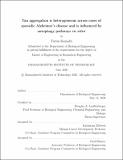Tau aggregation is heterogeneous across cases of sporadic Alzheimer's disease and is influenced by autophagy pathways in vitro
Author(s)
Kamath, Tarun(Tarun Vinod)
Download1196910130-MIT.pdf (14.88Mb)
Other Contributors
Massachusetts Institute of Technology. Department of Biological Engineering.
Advisor
Douglas A. Lauffenburger.
Terms of use
Metadata
Show full item recordAbstract
Tau neurofibrillary tangles or aggregates are a common neuropathological feature found in a number of neurodegenerative conditions, including Alzheimer's disease. Understanding the kinetics of this aggregate build up, how it varies across patients, and how aggregation might be influenced by intracellular pathways is critical for both a deeper knowledge of these disorders as well as identification of potential therapeutic targets. To this end, I employed an in vitro tau aggregation assay to study the kinetics of tau aggregation as it relates to aggregates in sporadic Alzheimer's disease. I found that the formation of aggregates was a logistic process, with a lag phase, an exponential rise phase, and a plateau phase. Aggregation kinetics varied significantly between different cases of sporadic Alzheimer's disease, paralleling the heterogeneity that is observed in the clinical presentation of Alzheimer's disease. Likewise, I found that inhibition of intracellular pathways of macroautophagy and endosomal microautopahgy heterogeneously increased tau aggregation and changed tau aggregation kinetics, dependent upon the case of Alzheimer's disease. These results inform that tau aggregates vary significantly not just between disorders, but even within disorders, and that protein degradation pathways uniquely process aggregates, perhaps potentiated by further molecular differences in aggregate structure or composition.
Description
Thesis: M. Eng., Massachusetts Institute of Technology, Department of Biological Engineering, May, 2020 Cataloged from PDF version of thesis. Includes bibliographical references (pages. 85-97).
Date issued
2020Department
Massachusetts Institute of Technology. Department of Biological EngineeringPublisher
Massachusetts Institute of Technology
Keywords
Biological Engineering.